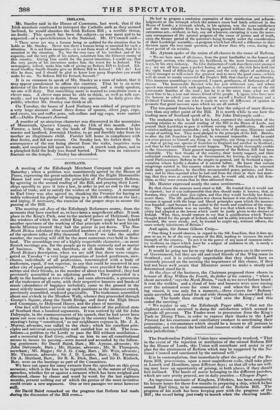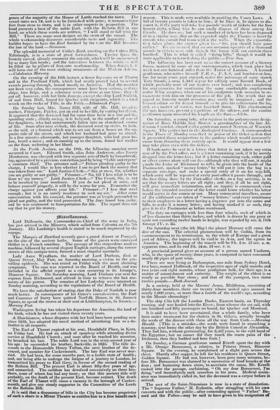The Dunfermline Political Union have unanimously resolved, " That in
the event of the rejection or mutilation of the second Reform Bill by the House of Lords, this Union will contribute and assist in any plan for the attainment of Reform which may be suggested by the Na- tional Council and sanctioned by thenational will."
It is in contemplation, that immediately after the passing of the Re- form Bill, processions, upon a most magnificent scale, shall take place at Lanark and Hamilton, upon different days ; so that all whO are will- ing may have an opportunity of joining, in both places, if they should feel inclined. The bands of music belonging to the different parishes, which are now pretty general, are in daily practice.—Glasgow Paper.
An ingenious mechanic of Kinghorn, Fifeshire, has been employing his leisure hours for these few months in preparing a ship, which he has named Earl Grey, to be commemorative of the Reform Bill. The progress of his work has been keeping pace with the progress of the Bill ; the vessel being just ready to launch when the cheering intern-
Bence of the majority. of the House of Lords reached the town. The vessel rates as a 74, and is to be furnished with guns ; it measures three feet from stern to stern, and is in other respects in proportion. The head presents a bust of the noble Earl, with the Reform Bill in one hand, on which these words are written, " I will stand cr fall with the Bill." There are some neat designs on the stern of the vessel. The whole workmanship discovers considerable taste and ingenuity. 1 he builder hopes to have the Earl finished by the t:ine the Bill 'becomes the law of the land.—Scotsnuot.
The splendid memorial of Cola's Bard, erecting on the Calton Hill,
Edinburgh, is in a state of great forwardness. Twelve lyres, de- licately carved, already ornament the outside, which will be surmounted by as many lion heads ; and the interstices between the windo.vs will
be filled up by pillars of first-rate workmanship. When linishe I, it will form one of the most striking ornaments of the Modern Athens. —Caledonian Mercury:
On the evening of the 10th instant, a dense fog came on at Thurso and in the Pentland Frith, which had nearly proved tit.,1 to several vessels passing through, bound mostly to America. Ifi:(1 the weather not been very calm, the consequences must have been serious, as three ships, two brigs, and a schooner were en shore at one time : they got of however, with but little damege, except the ship Lord Suffield, of and from Hull, bound for Quebec with emigrants, which is a total wreck on the rocks of Tills, in the Frith.—Edinburgh Paper.
On Sunday last, Mrs. Nancy Hill, wife of Mr. Hill, tin-plate worker, Friargate, Paisley, put an end to her life, by cutting her throat. It appeared that the deceased had for some time been in a low and de- sponding state ; chiefly owing, it is believed, to the conduct of one of her daughters, who had unfortunately fallen into an abandoned course of life. Soon after nine o'clock, the deceased went up stairs, to look, as she said, at a funeral which was to set out from a house on the op- posite side of the street, and which her husband had gone to attend. In a few minutes afterwards, her younger daughter, who had gone be- low, heard a noise ; and on running up to the room, found her mother on the floor, weltering in her blood.
At the Perth Assizes, on the 18th, the following amusing scene occurred in Court. Edward Smith, alias John Anderson, alias-henry Henderson, was charged with two separate acts of theft by housebreak.- i ng, aggravated by a previous conviction,:and by being " habit and repute" a common thief. The prisoner said—" Before pleading guilty to the charge, I would like to ken whether I am to get back the money that was taken from me." Lord Justice-Clerk—" Say at once, Sir, whether you are guilty or not guilty." Prisoner—" No, till I ken what is to be done wi' my money." Lord Justice-Clerk—" The Court, Sir, is not to be insulted by your insolence. If you do not plead at once, end behave yourself properly, it will be the worse for you. Remember the charge against you affects your life." Prisoner—" I ken that weer enough ; but it is no surely insolence to seek my ain." After some conversation with his counsel, the prisoner was at length persuaded to plead not guilty, and the trial proceeded. The Jury found him guilty, and he was sentenced to 'transportation for life. The report does not say that he got his money.



























 Previous page
Previous page